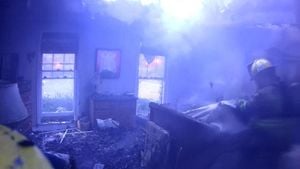A Catholic woman fired for opting against the COVID-19 vaccine has made headlines after winning nearly $13 million from her former employer, Blue Cross Blue Shield of Michigan (BCBSM). This significant ruling, delivered by a Michigan district court, centered on claims of religious discrimination, catalyzing discussions on vaccine mandates and their legal ramifications.
Lisa Domski's legal battle began after her dismissal from BCBSM, which she claimed was unjust due to her refusal of the vaccine on religious grounds. Her attorney, Jon Marko, articulated the crux of the case, stating it was about the fundamental right to religious freedom. The court determined BCBSM's actions violated her rights by not accommodating her request.
The ruling included $10 million as punitive damages, alongside additional awards: $315,000 for back pay, $1.375 million for front pay, and $1 million for non-economic damages, bringing the total to approximately $13 million. Domski and her legal team celebrated the decision as not just a victory for her, but for all individuals who face discrimination for their religious beliefs.
Marko expressed pride over their relentless pursuit of justice. He underscored the importance of this case, stating, "This case was one of the biggest honors of my career... it involved the biggest, most important thing to me in life, religious freedom!" The strong sentiments shared by Domski's legal team resonate with those who rally against mandates perceived to infringe on personal liberties.
Blue Cross Blue Shield of Michigan acknowledged the jury's verdict with disappointment, expressing respect for the judicial process but demonstrating concerns over the ruling. The company, worth approximately $32.8 billion, maintained its position on the necessity of vaccination policies during the pandemic, stating its employees played key roles in the promotion of health and safety.
BCBSM had enacted measures requiring employees to be fully vaccinated against COVID-19 or to request accommodations based on religious or medical reasons. The company insisted their accommodation process complied with both state and federal laws, aiming to uphold the sincerely held beliefs of its workers.
This case is part of wider conversations happening across the U.S. about vaccine mandates, especially within industries tied to healthcare, where public health measures have often collided with individual rights. Domski’s victory is viewed as pivotal, especially as several similar cases have emerged across the country.
Just last month, the U.S. House Energy and Commerce Committee, led by Republicans, released findings criticizing the Department of Health and Human Services for what they termed “a deeply flawed” COVID-19 messaging campaign. Such political dynamics underlie many discussions surrounding vaccine mandates—questions around effectiveness, public compliance, and individual rights often lead to polarizing opinions.
Supporters of the vaccine often critique attempts to sidestep mandates, stressing the importance of collective immunization efforts to curb virus spread. Nonetheless, cases like Domski's highlight the complexity of balancing public health initiatives with personal freedoms and religious beliefs.
Since the onset of the pandemic, many individuals across various sectors have voiced concerns over workplace policies related to vaccination, with numerous lawsuits sprouting nationwide. Courts are increasingly tasked with determining the fine line between employee rights and organizational responsibilities to maintain health standards.
This recent ruling may not only affect BCBSM but could also set precedents for similar cases across the healthcare industry and beyond. By awarding Domski substantial compensation, the court’s decision amplifies the message about the significance of religious accommodations, especially concerning mandates.
The debate is far from settled, as businesses and employees continue to navigate the convoluted legal waters of vaccination policies. A balancing act continues, balancing public health needs with respect for personal, religious beliefs.
All eyes will be on how BCBSM responds and what legal avenues they may pursue following this landmark ruling. The case marks not just Domski's personal victory but also surfaces larger societal questions about rights, health, and the limits of corporate authority during extraordinary public health crises.



